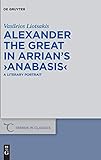Alexander the Great in Arrian’s ›Anabasis‹ : A Literary Portrait / Vasileios Liotsakis.
Material type: TextSeries: Trends in Classics - Supplementary Volumes ; 78Publisher: Berlin ; Boston : De Gruyter, [2019]Copyright date: ©2019Description: 1 online resource (XI, 284 p.)Content type:
TextSeries: Trends in Classics - Supplementary Volumes ; 78Publisher: Berlin ; Boston : De Gruyter, [2019]Copyright date: ©2019Description: 1 online resource (XI, 284 p.)Content type: - 9783110658736
- 9783110658798
- 9783110659979
- 938.07092 23
- DF234 .L568 2019
- online - DeGruyter
- Issued also in print.
| Item type | Current library | Call number | URL | Status | Notes | Barcode | |
|---|---|---|---|---|---|---|---|
 eBook
eBook
|
Biblioteca "Angelicum" Pont. Univ. S.Tommaso d'Aquino Nuvola online | online - DeGruyter (Browse shelf(Opens below)) | Online access | Not for loan (Accesso limitato) | Accesso per gli utenti autorizzati / Access for authorized users | (dgr)9783110659979 |
Browsing Biblioteca "Angelicum" Pont. Univ. S.Tommaso d'Aquino shelves, Shelving location: Nuvola online Close shelf browser (Hides shelf browser)
Frontmatter -- Foreword -- Contents -- Introduction -- 1. Overall Design: From Praise to Criticism -- 2. March-Narrative and Characterization -- 3. Atemporality and Characterization -- 4. Arrian Homericus: Alexander, the Epic Hero -- 5. General Conclusions -- Bibliography -- Index nominum et rerum -- Index locorum
restricted access online access with authorization star
http://purl.org/coar/access_right/c_16ec
Arrian’s Alexandrou Anabasis constitutes the most reliable account at our disposal about Alexander the Great's campaign in Asia. However, whereas the work has been thoroughly studied as a historical source, its literary qualities have been relatively neglected, with no autonomous monograph existing on this matter. Vasileios Liotsakis fills this gap in the studies of Alexander the Great’s literary tradition, by offering the first monograph on Arrian’s compositional strategies. Liotsakis focuses on the narrative techniques and verbal choices, through which Arrian allows praise and criticism to intermingle in his portrait of the Macedonian king. His main point of argument is that Arrian systematically exploits an abundance of narrative means (military descriptions, presentation of peoples, march-narratives, anachronies, and epic elements) in order to draw the reader’s attention not only to Alexander’s intellectual skills but also to the fact that the king was gradually corrupted by his success. This book puts Arrian’s literary contrivances under the microscope, sheds new light on unexplored aspects of the Anabasis’ narrative arrangement, and contributes to the studies of Alexander’s prosopography in Classical historiography.
Issued also in print.
Mode of access: Internet via World Wide Web.
In English.
Description based on online resource; title from PDF title page (publisher's Web site, viewed 28. Feb 2023)









